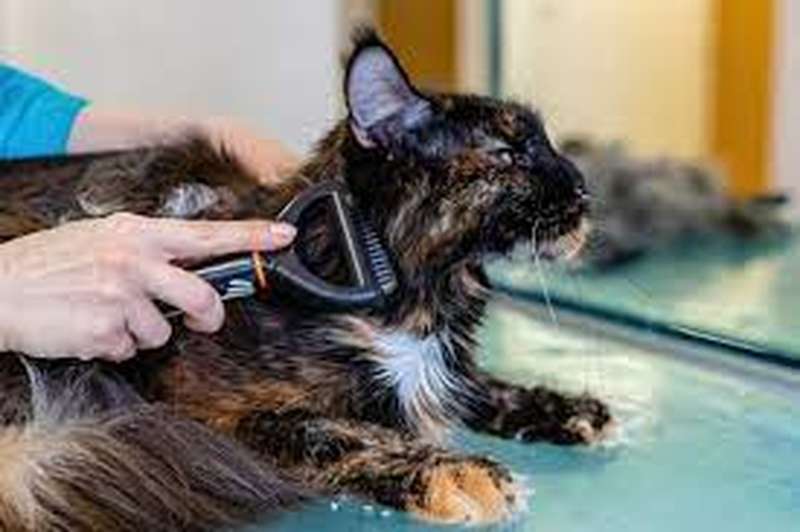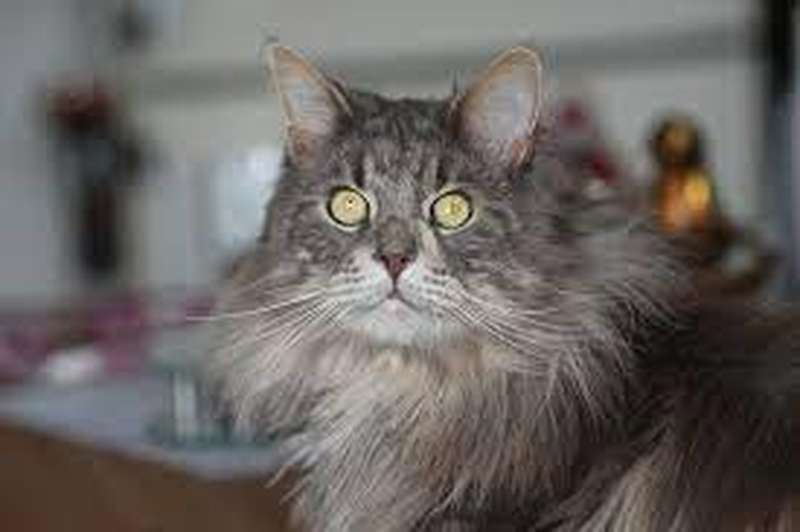Maine Coons are North America’s largest and oldest household cats. Long, impermeable undercoat and glossy topcoat. This coat requires little upkeep.
Maine Coon Cat Breed Overview
OTHER NAMES: Gentle Giant.
PERSONALITY: Amiable, gentle, and dog-like.
WEIGHT: Males can weigh up to 20 pounds; the typical range is 9 to 18 pounds.
LENGTH: About 19 to 30 inches.
COAT LENGTH: Heavy and shaggy. Silky with coat falling smoothly.
COAT COLOR: Solid (white, black, blue, red, and cream), tabby (classic, mackerel, and ticked), bi-color (black and white, blue and white, red and white, and cream and white), parti-color (tortoiseshell and blue-cream), parti-color and white (calico, tortoiseshell and white, blue-cream and white), shaded, and smoke and white are the different types of coat colors.
EYE COLOR: Varies according to coat color, but maybe green, gold, green-gold, copper, blue, or odd-eyed.
LIFE EXPECTANCY: 12 to 15 years.
HYPOALLERGENIC: No.
ORIGIN: United States.
The Maine Coon cat possesses several distinctive characteristics.
This cat is known for its dog-like disposition, as it is intelligent, friendly, and gentle. These cats are known for their laid-back and self-assured nature, making them excellent companions for gentle children.
They have a calm demeanor and easily adapt to various situations, making them great playmates.
They are able to peacefully coexist with other household pets, such as other cats and dogs that are friendly towards cats.
These cats are known for being sociable and inquisitive. They have a tendency to be present wherever the action is happening in the house, always finding a way to involve themselves in any interesting situation.
This breed is known for being talkative, but not excessively loud.
It expresses itself through a range of gentle and melodious meows, chirps, and trills. These cats are highly trainable and take pleasure in learning tricks. They respond positively to training methods that involve rewards and tasty treats.
Contrary to the old stereotype, they are actually fond of water.
They enjoy playing in it, bathing in it, and even dipping their food in it. Some Maine Coons are even known to swim.
Top 5 Grooming Tips

Brushing the heavy coat
The feline’s thick coat is its best feature, so it is important to use the proper strokes when grooming it. Choose a slicker brush or a metal comb, as they are effective at penetrating thick fur.
If your cat is having trouble with brushes, consider using a grooming glove instead.
To maintain a healthy and mat-free coat, it is recommended to brush the cat at least once a week.
Begin by brushing from the head and proceed with a gentle motion down the body, gradually moving towards the tail.
It is important to always brush gently in the direction of the fur’s growth.
Please give special attention to the neck, legs, and tail. To properly groom this breed, it is essential to use the correct stroke and brush.
After grooming, it is advisable to brush your pet on a washable surface to remove any loose hair effectively.
Trimming the hair.
It is not suitable for a cat to have long hair that interferes with its ability to eat and play.
It is advisable to regularly trim your cat’s hair to prevent this issue and enhance its appearance to people passing by.
It is important to carefully consider the type of scissors to use when clipping a Maine Coon’s fur in order to enhance their grooming and make them look even more adorable.
In addition, mats have a tendency to form over time. It is natural for this breed. To remove tangled hair, you can either use scissors or patiently untangle the mats.
Do not pull the mats from the animal, as this may cause them harm.
Bathing a Maine Coon cat
These felines are widely renowned for their affinity for water! Introducing your kitten to bathing is an excellent way to help them become accustomed to it in the future.
When introducing the concept of bathing, it is crucial to proceed slowly and gently. It is important never to force someone to participate if they do not want to.
Using high-quality cat shampoo is crucial for achieving optimal results. Using human shampoo on your cat is not advised.
I had a successful experience bathing my kitten.
Claw maintenance
Long nails are generally considered unacceptable or undesirable. You are neglecting to trim your cat’s claws, which can cause discomfort for both you and your cat.
This could potentially cause scratches on both your furniture and your skin. These cats should have their nails trimmed every few weeks to prevent them from growing too long.
For this task, it is recommended to use a pair of guillotine-style nail clippers.
Ensure to avoid the quick, which is the pink part of the nail, as it can cause pain and result in bleeding.
If you are not comfortable trimming your pet’s claws, you can visit a veterinarian who will be able to do it for you.
Cut the Maine Coon’s fur short.
These cats are renowned for their luxurious fur, which requires regular grooming to prevent it from becoming unruly.
Certain cat owners opt to take their feline companions to a professional groomer in order to have their fur trimmed. If you choose to trim your cat’s fur yourself, it is important to use sharp clippers and scissors.
Avoid making cuts that are too close to the skin.
If you accidentally cut your cat, it is important to stop immediately and apply pressure to the wound using a clean cloth.
If the bleeding does not stop, please contact your veterinarian for further assistance.
How much shedding is considered excessive for these cats?

Maine Coons exhibit a wide range of colors, fur lengths, and densities. The shedding frequency of each individual can vary.
The shedding schedule of your pet can be influenced by various factors, including the weather.
Due to their ability to adapt to the outdoor climate, cats experience variations in their shedding patterns throughout the year.
As winter approaches, your cat’s coat naturally becomes denser to provide them with warmth and comfort.
As spring arrives, shedding will increase in anticipation of warmer days.
The amount your cat sheds also depends on the following:
- The influence of genes
- Whether or not they experience allergies.
- Food preferences
- Overall wellness
- Regardless of whether they live indoors or outdoors
- Experiencing stress
It is important to note that there is a distinction between shedding and losing hair.
Regular grooming will help you monitor the amount of hair that your cat typically sheds. A significant increase in the amount can indicate:
Underlying health issues.— Ringworm, thyroid imbalance, obesity, and allergies are potential causes of rapid fur loss in cats.
Ensure that you provide your cat with a diet consisting of healthy and nutritious food to maintain their optimal physical condition.
An inadequate diet— Allowing your cat to roam outdoors puts them at risk of ingesting toxic substances, which can have detrimental effects on their health.
Your cat’s hair loss could potentially be caused by a diet that is high in sugar, grains, carbohydrates, and other nutrients that offer little to no value.
Unsuitable grooming— If you do not groom your cat regularly or use tools that can harm their fur and skin, it may result in hair loss for them.
With the right nutrition, you can reduce shedding and keep a beautiful coat.
To ensure your Maine Coon’s coat stays healthy, shedding is minimized, and potential health issues are prevented, it is important to groom them regularly and provide them with a well-balanced diet that closely resembles the natural food of felines. There are two primary nutrients that should be included:
- Protein from animals
- Fat from animals
Animal protein is a type of protein derived from animals.
Felines, unlike vegans, cannot thrive on a plant-based diet and may not be able to maintain good health and longevity.
Vegetables can be challenging for Maine Coon cats to digest and may not fulfill their protein requirements since cats are unable to process plant protein effectively.
Animal protein provides essential amino acids, such as taurine and arginine, which support the health of your cat.
- Expansion and restoration of hair
- The growth of muscle
- Adequate organ performance
Animal fat is a type of fat that is derived from animals.
Animal fat is a highly beneficial secondary source of energy for felines. It contains important fatty acids, including linoleic acid, arachidonic acid, and omega-3 and omega-6 acids.
These fatty acids are essential for various bodily functions.
Take steps to regulate your cat’s inflammatory response.
To maintain the shine of your Maine Coon coat, follow these tips:
Assist felines in healing skin abrasions.
Fat is known to enhance the flavor of food for felines, making it appealing even to picky cats.
To ensure that your Maine Coon has a healthy diet, it is important to provide them with a high protein content of over 50%.
Additionally, their diet should include up to 20% animal fat, which promotes a sleek coat, reduces shedding, and contributes to their overall well-being.
Animal fat is a type of fat derived from animals.
Animal fat is a highly beneficial secondary energy source for cats. It contains important fatty acids, including linoleic acid, arachidonic acid, and omega-3 and omega-6 acids. These fatty acids are essential for various bodily functions.
- Take steps to regulate your cat’s inflammatory response.
- Make sure the coat of your Maine Coon is as shining as possible.
- Assist felines in healing skin abrasions.

Fat is known to enhance the flavor of food for felines, making it irresistible even to picky cats.
To ensure your Maine Coon’s optimal health and appearance, it is important to provide them with a diet that is rich in protein, comprising over 50% of their food.
Additionally, their diet should contain up to 20% animal fat, as this will contribute to a lustrous coat, minimize shedding, and promote overall well-being.
Foods that may negatively impact the quality of your Maine Coon’s coat.
Food containing the following ingredients may have a negative impact on the coat of your Maine Coon:
Grains, cereals, and sugar- Your Maine Coon may struggle to digest food that contains these ingredients due to their high carbohydrate content.
Cats typically require only minimal amounts of carbohydrates in their diet, usually less than 3%.
The meat sources are undefined- Avoid any product that contains “animal byproducts” or “meat derivatives” in its list of ingredients.
The presence of questionable ingredients can potentially cause gastrointestinal issues and allergies, which can negatively impact not just the coat of your Maine Coon, but also your overall well-being.